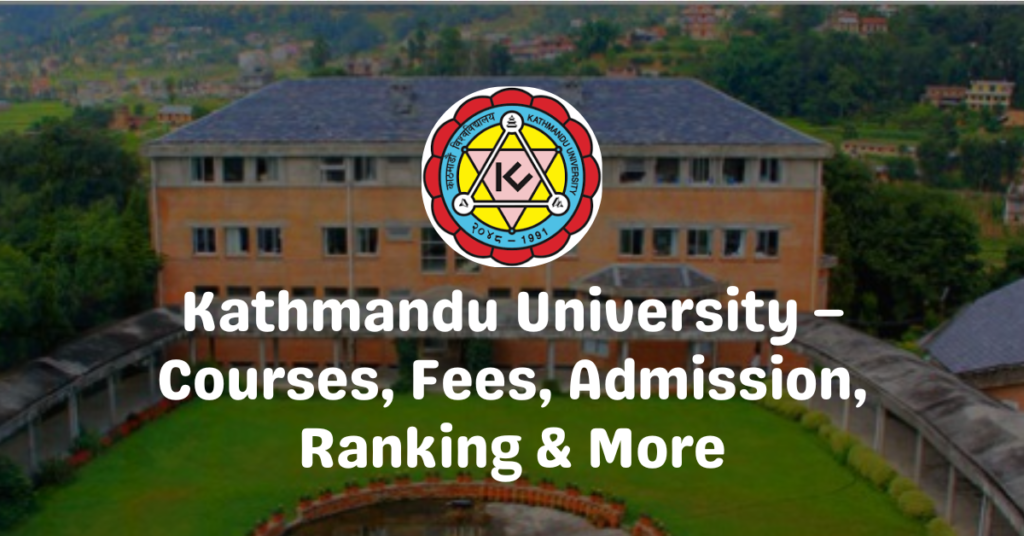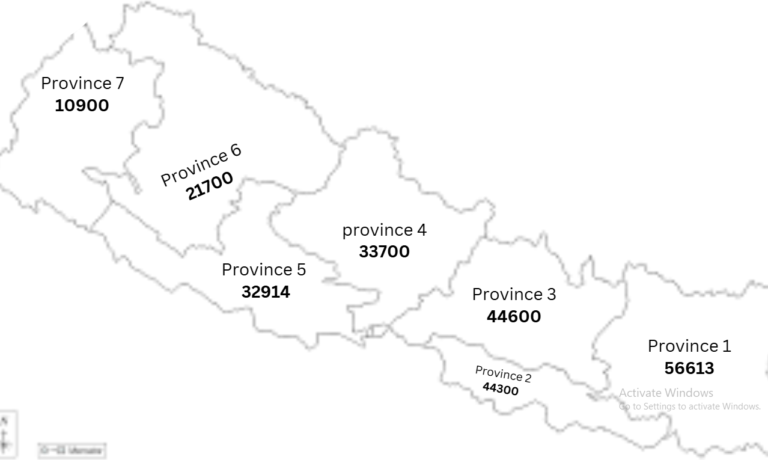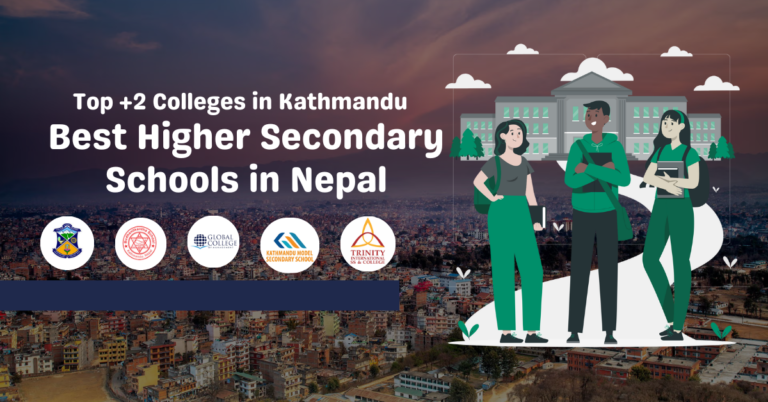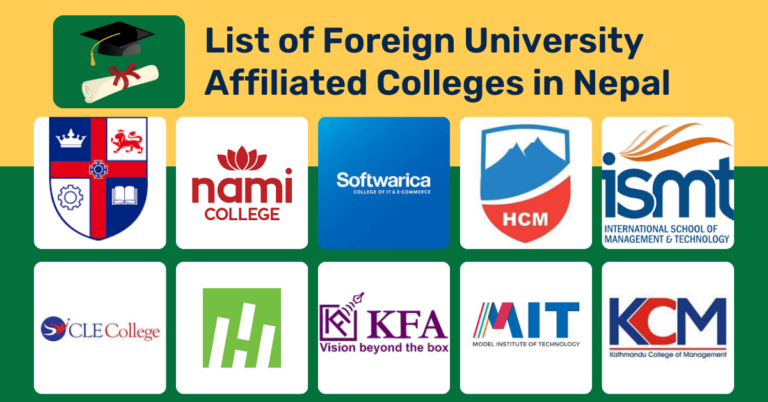Kathmandu University – A Complete Guide for 2025
Introduction to Kathmandu University
Historical Background and Establishment


Kathmandu University, commonly known as KU, is one of the most prestigious and pioneering institutions in Nepal. Established in 1991, KU was born out of the vision to create a high-standard, autonomous, not-for-profit, and non-governmental public institution dedicated to excellence in education. It was formally inaugurated by the then Prime Minister of Nepal and has since been a trailblazer in higher education in the country. Situated in Dhulikhel, about 30 kilometers east of Kathmandu Valley, the serene and scenic environment provides a peaceful academic atmosphere unlike any other in Nepal.
KU started with a very modest beginning, initially offering just a few programs under the Faculty of Science. However, over the years, it has grown into a multidisciplinary university that spans across science, engineering, management, law, medical sciences, and the arts. Its evolution reflects Nepal’s growing commitment to academic development and global competitiveness.
Vision, Mission, and Core Values
Kathmandu University’s vision is “to become a world-class university devoted to bringing knowledge and technology to service humanity.” This speaks volumes about its goal—not just to educate but to empower individuals to impact society. The mission statement emphasizes quality education, innovative research, and sustainable development, making it stand out among institutions in the region.
Its core values include integrity, academic freedom, inclusivity, and excellence. These values are instilled in both the curriculum and the culture of the university. KU not only promotes academic rigor but also a sense of responsibility among students to use their education for community betterment and global solutions.
Why Choose Kathmandu University?
Reputation and Academic Excellence
When students and parents seek a top-notch academic experience in Nepal, Kathmandu University often tops the list. Its reputation is built on consistently delivering quality education that rivals international standards. KU ranks as one of the leading universities in South Asia, and its graduates are highly sought after in the job market, both in Nepal and globally.
One of the main reasons for its academic excellence is the focus on research-based and industry-oriented education. Professors at KU are not just teachers but also researchers and innovators in their respective fields. The university invests heavily in academic infrastructure, laboratories, and faculty development, ensuring that the learning process is robust and up-to-date.
International Recognition and Partnerships
What sets KU apart is its global outlook. The university has signed MoUs and academic exchange agreements with over 70 international universities and institutions. These partnerships enable student exchange programs, dual-degree options, joint research, and internships abroad. Students have the opportunity to learn from international faculty, work on global projects, and build a career that crosses borders.
Some of its major partners include Norwegian University of Science and Technology, University of Tokyo, AIT Thailand, and many Indian Institutes of Technology (IITs). This global connectivity allows KU to stay updated with international curricula, academic trends, and technology adoption, making it a globally competitive university.
Unique Teaching-Learning Approach
At Kathmandu University, the teaching style is uniquely student-centered. The university emphasizes critical thinking, practical exposure, and collaborative learning. Classrooms are often interactive, and students are encouraged to participate in discussions, projects, and real-world problem-solving.
A strong mentor-mentee system exists, where faculty members guide students through academic and career challenges. Moreover, KU places significant importance on project-based learning, case studies, fieldwork, and internships. This hybrid model of theoretical and hands-on education ensures graduates are job-ready and innovative in their approach to challenges.
Academic Programs at Kathmandu University
Undergraduate Programs
Kathmandu University offers a wide range of undergraduate programs across its faculties. Whether you’re inclined toward science, engineering, business, or humanities, KU has something to offer. The undergraduate curriculum is designed to foster independent thinking and real-world application of knowledge.
Popular undergraduate programs include:
- Bachelor in Engineering (Civil, Computer, Electrical, Mechanical, Geomatics, etc.)
- BSc in Environmental Science and Biotechnology
- Bachelor of Business Administration (BBA)
- Bachelor in Media Studies
- Bachelor of Arts in Economics, Social Work, and Development Studies
- MBBS and Bachelor of Dental Surgery (through KU-affiliated medical colleges)
Each program incorporates rigorous coursework, seminars, research projects, and field assignments. Students can also access exchange programs with foreign universities, giving them a global edge.
Postgraduate and Doctoral Studies
For those seeking advanced education, Kathmandu University provides numerous master’s and PhD programs. These programs are highly research-oriented and industry-relevant. The university supports innovation through grants, thesis funding, and collaborations with research bodies both locally and internationally.
Some key PG programs include:
- MSc in Computer Science, Biotechnology, and Environmental Engineering
- MBA, EMBA, and MBM (Master of Business and Management)
- MTech in Information Technology
- MA in English Literature, Development Studies
- M.Ed and PhD in Education
KU’s doctoral programs are designed to groom the next generation of scholars, researchers, and academic leaders. Doctoral students receive access to international conferences, research fellowships, and state-of-the-art labs.
Short-Term and Professional Courses
Recognizing the need for continuous education, KU offers short-term certification and diploma courses in areas such as:
- Data Science
- Project Management
- English Language Proficiency
- Business Analytics
- Climate Change and Sustainability
These programs are perfect for working professionals or students wanting to upskill quickly. The flexible learning schedules and expert instructors make them highly practical and impactful.
Faculties and Schools at Kathmandu University
School of Science
The School of Science is one of KU’s founding faculties and a pillar of its academic strength. It offers undergraduate and graduate degrees in fields such as Environmental Science, Computer Science, Pharmacy, and Biotechnology. With modern labs and highly qualified professors, the School of Science is a hub for research and innovation.
Faculty members collaborate with international universities for research in renewable energy, biodiversity, climate change, and molecular biology. Students often get to work on government or NGO-funded research projects, adding value to their academic profile.
School of Engineering
One of the most sought-after faculties at KU, the School of Engineering provides courses in Civil, Electrical, Computer, Mechanical, and Geomatics Engineering. The programs are accredited and follow an internationally benchmarked syllabus.
The engineering school has partnerships with national infrastructure projects, IT companies, and international consultants, which ensures that students get real-world exposure. Regular workshops, hackathons, and industrial visits enrich the learning process.
School of Management
The School of Management (KUSOM) is one of the most prominent business schools in Nepal. It has consistently maintained its reputation as a top-tier management education provider since its establishment. KUSOM offers undergraduate, graduate, and executive programs tailored to meet the changing demands of the business world.
Popular programs include:
- Bachelor of Business Administration (BBA)
- Master of Business Administration (MBA)
- Executive MBA (EMBA)
- MBA in Leadership and Management
- Master in Public Policy and Management (MPPM)
The School of Management at KU emphasizes case studies, experiential learning, and leadership development. Students are encouraged to take part in national and international competitions, internships, and consulting projects. The faculty includes seasoned professionals and academics with real-world business experience, making the learning both theoretical and practical.
In addition, KUSOM has a strong focus on entrepreneurship. It supports startups through incubation centers, business labs, and mentorship. Its alumni network includes many successful entrepreneurs, CEOs, and thought leaders in Nepal and abroad.
School of Arts, Education, and Law
This school combines creativity, critical thinking, and social impact. It houses programs in media studies, development studies, education, and law. The diversity in course offerings reflects the university’s commitment to interdisciplinary education and inclusive development.
Some of the flagship programs include:
- Bachelor and Master in Media Studies
- BA and MA in Development Studies
- Bachelor of Social Work (BSW)
- M.Ed and PhD in Educational Leadership
- LLB and LLM programs
These programs focus on building responsible citizens who can lead social change. Practical internships with NGOs, government bodies, and media houses are integral parts of the curriculum. In particular, the media and law departments are gaining traction for their innovative approaches to curriculum design and field immersion.
The School of Education and Law also plays a crucial role in policy advocacy and educational reform in Nepal. Through research and outreach programs, students and faculty alike contribute to shaping future education and justice systems.
School of Medical Sciences
Kathmandu University School of Medical Sciences (KUSMS), in collaboration with Dhulikhel Hospital, is a prestigious hub for healthcare education and research. It provides MBBS, BDS, and allied health programs such as BPT (Physiotherapy), B.Sc. Nursing, BPH (Public Health), and more.
One of KU’s greatest strengths lies in its practice-oriented approach. Students spend a significant portion of their time in Dhulikhel Hospital, which serves as a real-life training ground. This exposure equips future doctors and health professionals with the skills and empathy needed in the medical field.
KUSMS also affiliates with more than 15 medical colleges across Nepal, allowing students from all regions to access Kathmandu University’s high standards. Advanced laboratories, community outreach programs, and clinical training make this school a prime choice for medical aspirants.
Moreover, the research initiatives in KUSMS focus on pressing healthcare challenges like maternal health, child nutrition, and tropical diseases. Many graduates go on to specialize or pursue higher studies abroad, further enhancing the university’s reputation.
Admission Process at Kathmandu University
Eligibility Criteria
Getting into Kathmandu University is competitive, and rightly so. The university maintains high admission standards to ensure academic excellence. For undergraduate programs, candidates must have completed their 10+2 or equivalent education with a minimum GPA (usually 2.0–2.4 depending on the program) and meet specific subject requirements.
For graduate programs, a recognized bachelor’s degree with a minimum GPA or division (often 2.5 GPA or second division) is required. PhD aspirants need to hold a master’s degree in a related field and must submit a comprehensive research proposal.
Professional programs like engineering and medicine may have stricter academic criteria and prerequisites, especially in core science and math subjects.
Admission Tests and Application Timeline
Most faculties conduct entrance exams, which test aptitude, subject knowledge, and analytical skills. For example:
- The KUUMAT (Kathmandu University Undergraduate Management Admission Test) for BBA and MBA aspirants.
- KU Engineering Entrance Exam for engineering programs.
- KUSMS entrance exams for MBBS, BDS, and allied health programs.
The admission season typically starts in July–August for most programs. Application forms are made available online, and students must apply within the announced deadline. Shortlisted candidates are invited for tests and interviews.
Some faculties also consider personal statements, letters of recommendation, and portfolios (for design and media courses). International students can apply through special admission routes with provisions for English proficiency tests and visa guidance.
Tips for a Successful Application
- Start Early: Prepare your academic documents, recommendation letters, and personal statement ahead of time.
- Understand the Requirements: Read the prospectus carefully for eligibility, entrance criteria, and program details.
- Ace the Entrance: Take mock tests, review past papers, and focus on your weak areas.
- Show Your Passion: In your essay or interview, be authentic and highlight your interest in the chosen field.
- Follow Deadlines: Keep track of deadlines and application updates on the KU website.
Campus Facilities and Student Life
Modern Infrastructure and Amenities
Kathmandu University offers a well-developed, modern campus nestled in the picturesque hills of Dhulikhel. It’s not just about books and lectures—KU’s infrastructure plays a key role in delivering a quality academic experience. The university has invested heavily in academic buildings, high-tech laboratories, libraries, seminar halls, and IT-enabled classrooms. The main library is well-stocked with academic journals, e-resources, and research archives, making it a haven for students and scholars alike.
Beyond academics, the campus boasts sports facilities, cafeterias, medical centers, auditoriums, and eco-friendly green zones. Dormitories are available for both male and female students with hygienic dining, Wi-Fi access, and 24/7 security. For engineering and science students, specialized laboratories provide hands-on experience with real-time problem-solving projects.
Dhulikhel itself enhances the learning environment—peaceful, pollution-free, and surrounded by natural beauty. It provides the kind of academic serenity hard to find in crowded cities, enabling students to focus deeply on their studies while enjoying a balanced lifestyle.
Student Clubs and Activities
Student life at Kathmandu University isn’t confined to textbooks. The university has over 50 student-run clubs and organizations that cater to various interests including:
- Robotics Club
- Debate and Public Speaking Society
- Drama and Performing Arts Club
- Environment and Sustainability Group
- Sports Teams (football, basketball, cricket, volleyball)
These clubs provide students with leadership opportunities, platforms to showcase their talents, and networks for career growth. Annual events such as “KU Carnival,” Tech Fest, and Cultural Weeks bring the community together and add vibrancy to campus life.
Moreover, students are encouraged to participate in volunteer programs, exchange delegations, and community outreach. KU promotes holistic development—academic excellence combined with social awareness and teamwork.
Scholarships and Financial Aid
Merit-Based Scholarships
Kathmandu University believes in rewarding academic brilliance. Each year, the university offers merit-based scholarships to top-performing students across all faculties. These scholarships often cover full or partial tuition fees, and recipients are selected based on GPA, entrance exam results, and performance in previous academic years.
For example, the “KU Merit Scholarship” covers up to 100% tuition for students who score highest in KU’s entrance exams. Similarly, departmental scholarships may be offered by individual faculties to students showing exceptional promise in their disciplines.
Need-Based Financial Support
Recognizing that financial constraints can be a barrier to education, KU offers need-based assistance to economically disadvantaged students. The university assesses family income, socioeconomic background, and student motivation before awarding aid. In some cases, this support may include full fee waivers, while in others, students might get interest-free education loans.
An important initiative is the “Work-Study” program, where students work part-time within the campus—libraries, admin offices, labs—to earn stipends and reduce financial burdens.
External Scholarships and Partnerships
KU is affiliated with several national and international bodies that sponsor students. External scholarships from DAAD (Germany), Erasmus+, and various Nepalese NGOs help deserving students pursue their education without financial stress.
Many faculties also have specific collaborations that offer exchange scholarships, especially for students studying science, engineering, and development. These allow students not only to get financial help but also gain valuable international exposure.
Rankings and Global Recognition
National and International Rankings
Kathmandu University consistently ranks among the top institutions in Nepal and is often cited in regional and international rankings. Although Nepal lacks a consolidated national ranking system, KU is widely recognized as the best private university and often ranks within the top two alongside Tribhuvan University.
Globally, KU has appeared in university listings such as:
- QS Asia University Rankings
- UI GreenMetric World University Rankings (for sustainability)
- Webometrics Ranking of World Universities
KU’s focus on quality, internationalization, and research output has steadily improved its global visibility. These rankings are driven by factors like academic reputation, employer reputation, faculty-student ratio, international collaborations, and research impact.
Affiliations and Accreditations
Kathmandu University is recognized by the University Grants Commission (UGC) Nepal. Many of its programs have received international accreditation or are aligned with globally accepted frameworks. Engineering programs follow ABET-inspired structures, and management courses are aligned with AMBA standards.
Its collaborations with universities such as AIT Thailand, University of Oslo, and IITs, along with recognitions from UNESCO, WHO, and international donor organizations, further strengthen its credibility.
International Students and Exchange Programs
Admissions for Foreign Students
Kathmandu University has opened its doors to international students from over 25 countries including India, Bangladesh, Bhutan, China, the United States, and various African nations. Special provisions exist for foreign admissions, with separate quotas and simplified visa and enrollment processes.
International applicants must meet the same academic standards but may be exempt from some entrance tests. Instead, interviews or document-based evaluations are conducted. The university helps with visa processing, accommodation, and orientation programs to make the transition smooth.
Exchange and Dual-Degree Opportunities
One of the most exciting aspects of studying at KU is the opportunity to engage in academic exchange. Many faculties offer semester-long exchange programs with universities in Europe, Japan, and South Asia. These programs are often supported by Erasmus+, DAAD, or bilateral agreements.
Some departments also offer dual-degree programs where students spend a part of their studies in Nepal and the rest at a partner university abroad. These partnerships enhance global exposure and employability.
Cultural Integration and Support Services
KU makes a conscious effort to integrate international students into campus life. Cultural exchange events, language support classes, international student clubs, and mentorship programs ensure that students from different backgrounds feel welcomed and supported.
The Office of International Relations provides continuous assistance to foreign students regarding visa issues, health insurance, academic advising, and language adaptation.
Research and Innovation at Kathmandu University
Pioneering Research Centers and Labs
Kathmandu University stands out not just for its academic programs, but also for its unwavering commitment to research and innovation. The university has set up multiple research centers and advanced laboratories across disciplines, which play a pivotal role in contributing to national and global knowledge.
Some notable research centers include:
- Centre for Energy Studies (CES) – focused on renewable energy, hydropower, and sustainable technology
- High-Voltage Laboratory – one of Nepal’s most advanced electrical testing facilities
- Biotechnology Laboratory – dedicated to genetic engineering, molecular biology, and agricultural biotech
- Open and Distance Learning Centre (ODLC) – promoting technology-based education for rural Nepal
Faculty members actively participate in collaborative projects with foreign universities and governmental agencies, including research on climate change, AI in education, public health, and environmental conservation.
Student-Led Innovations and Incubation
KU encourages a culture of curiosity and hands-on innovation among its students. Engineering, science, and business students are often seen developing real-world solutions through campus competitions and capstone projects. The university’s Business Incubation Centre supports student startups with workspace, mentorship, and access to seed funding.
Over the years, students have created impactful innovations such as:
- Low-cost water purifiers for rural areas
- Mobile health monitoring apps
- Drone-based agricultural mapping systems
These projects not only gain recognition nationally but also compete in international contests and pitch events, reinforcing KU’s stature as a hub of innovation.
Grants, Publications, and Collaborations
The university has received grants from global institutions such as the World Bank, UNESCO, European Union, and Norwegian Agency for Development Cooperation (NORAD). These funds support interdisciplinary research in education, gender equity, sustainable development, and more.
Faculty and graduate students publish regularly in high-impact journals. KU also hosts international conferences and publishes its own journals like the Journal of Kathmandu University and KU Medical Journal (KUMJ).
The active research culture ensures that Kathmandu University contributes meaningfully to science, policy-making, and community development in Nepal and beyond.
Alumni Network and Career Opportunities
Success Stories and Global Impact
Kathmandu University has built a strong and diverse alumni network spread across various continents. From CEOs of multinational companies and top medical professionals to social entrepreneurs and academic scholars, KU alumni are making their mark globally.
Some alumni have gone on to pursue higher education at Ivy League schools and top universities such as Oxford, MIT, and Stanford. Others have become key decision-makers in Nepal’s government, UN agencies, and leading tech firms like Microsoft, Google, and Infosys.
These success stories reflect the quality and versatility of KU’s education and inspire current students to aim higher.
Career Development and Internship Programs
To ensure students are industry-ready, KU has a dedicated Career Services Office that facilitates internships, job placements, and training. The university maintains active ties with national and international employers, and many students secure internships at:
- UNDP, UNICEF, and INGOs
- IT firms and tech startups
- Engineering consultancies and banks
- Hospitals and pharmaceutical companies
Internships are often mandatory, and students receive mentorship from both academic supervisors and industry mentors. KU also organizes career fairs, campus recruitments, and resume-building workshops.
Entrepreneurial Ecosystem and Startup Support
In a rapidly evolving world, KU encourages entrepreneurship as much as employment. The Entrepreneurship and Innovation Cell helps students incubate business ideas, access seed funding, and connect with investors.
Notable startups founded by KU alumni include:
- eSewa (Nepal’s leading digital wallet)
- Khalti (online payment gateway)
- Tootle (ride-sharing app)
- Eco Infinity (renewable energy solution provider)
These ventures have disrupted industries and created jobs, proving that KU doesn’t just educate students—it builds leaders.
Community Engagement and Social Responsibility
Outreach Programs and Community Projects
True to its motto of serving humanity through knowledge, Kathmandu University engages in numerous social initiatives. From health camps and rural education drives to solar electrification and water management, KU’s students and faculty work directly with underprivileged communities across Nepal.
One prime example is the Dhulikhel Community Hospital, which serves as both a healthcare center and a learning hub. The hospital provides affordable treatment while training medical students in compassionate, hands-on healthcare delivery.
Similarly, students from engineering and management programs contribute to rebuilding efforts in earthquake-affected regions, design sustainable housing, and teach computer literacy in village schools.
Environmental Sustainability and Green Campus
KU is committed to environmental protection. Its Green Campus Initiative promotes energy efficiency, waste reduction, and tree plantation. Solar panels, rainwater harvesting, and eco-friendly construction practices make KU a model for other institutions in Nepal.
Research projects on climate adaptation, forest conservation, and carbon neutrality are frequently conducted in partnership with international environmental bodies.
By integrating environmental awareness into academics and operations, Kathmandu University prepares its students to be responsible global citizens.
Conclusion: Why Kathmandu University is Nepal’s Academic Crown Jewel
Kathmandu University is more than just an educational institution—it’s a movement that’s transforming lives through knowledge, innovation, and social impact. With globally recognized programs, a serene yet technologically advanced campus, robust research output, and a student-centric approach, KU offers a rare blend of academic excellence and meaningful life preparation.
Whether you’re an aspiring engineer, doctor, manager, scientist, or artist, KU provides the foundation, the tools, and the opportunities to build a successful and impactful career. It’s a place where dreams are nurtured, leaders are created, and the future is shaped.
For students in Nepal and beyond, Kathmandu University stands as a beacon of quality, integrity, and global relevance.
FAQs
1. What is the ranking of Kathmandu University in Nepal?
Kathmandu University is consistently ranked as one of the top two universities in Nepal, known for its academic excellence and innovation-focused programs.
2. How can international students apply to KU?
International students can apply via a dedicated admission process with separate quotas and relaxed entrance criteria. They can apply online and receive support with visas and accommodation.
3. Are there scholarships available at Kathmandu University?
Yes, KU offers merit-based, need-based, and external scholarships for deserving students. There are also work-study programs and financial aid options available.
4. What are the most popular courses at KU?
Popular programs include Engineering (Civil, Computer, Electrical), MBBS, BBA, MBA, Environmental Science, Biotechnology, and Media Studies.
5. Does KU support entrepreneurship?
Absolutely! KU has its own startup incubator and entrepreneurship cell, helping students launch ventures, secure funding, and get mentorship.







